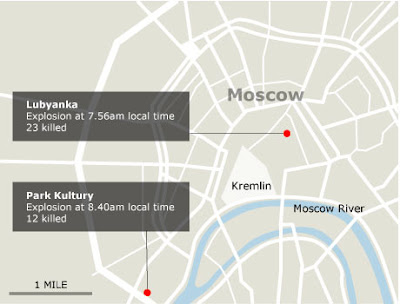Moscow metro bombs kill dozens
Two female suicide bombers blew themselves up on the Moscow subway during the morning rush hour today, killing at least 37 people and injuring more than 60, Russian officials said.
Yuri Luzhkov, the mayor of Moscow, told reporters the suicide bombers were believed to have set off their explosives as trains approached Lubyanka and Park Kultury metro stations.
"The first data that the FSB [Federal Security Service] has given us is that there were two female suicide bombers," he told reporters at Park Kultury.
Vladimir Putin, the prime minister, who broke off a visit to the Siberian city of Krasnoyarsk, said those responsible for the attacks would be "destroyed".
"A crime that is terrible in its consequences and heinous in its manner has been committed," Putin said at the start of a video conference. "I am confident that law enforcement bodies will spare no effort to track down and punish the criminals. Terrorists will be destroyed," said Putin, who was propelled to the Russian presidency in 2000 following his tough response to the Chechnya conflict.
The first blast happened at the busy Lubyanka interchange near the headquarters of the FSB, the successor to the KGB. The explosion went off at a point where two metro lines converge, a 10-minute walk from Red Square and the Bolshoi Theatre.
Officials said at least 23 people died at Lubyanka and 12 to 14 were killed in the second explosion at Park Kultury, near Gorky Park.
Vladimir Markin, a spokesman in the prosecutor general's office, said body parts of the Park Kultury suicide bomber had been recovered and examined.
They showed that the bomb – weighing between 1kg and 2kg and containing shrapnel – was at belt level. Markin said the bomber blew herself up as the carriage doors opened.
Panic as commuters try to escape
Witnesses spoke of panic at the stations with people falling over each other in dense smoke and dust as they fled.
The Russian civil aviation authorities ordered increased security at airports, fearing further attacks.
"At Lubyanka metro the epicentre of the explosion was in the second car," said Pyotr Biryukov, the first deputy mayor of Moscow. "At Park Kultury it was the third car. Somebody got into the carriages and blew themselves up."
Damage to the stations themselves was minimal, he said, and they were expected to reopen later today.
Yuri Syomin, the head of the Moscow prosecutor's office, said the attacks had almost certainly been carried out by suicide bombers who boarded the metro at the height of the rush hour.
"Investigators are at the scene and people from bomb department are working there," he said. "The figures are not final yet. Now is the time to save people."
Andre Mishenko, the deputy in charge of the rescue operation, said: "We are going through the carriage at the moment and taking out the dead.
"The victims are being taken to a morgue in Moscow and survivors to Moscow hospitals. Investigations are continuing."
People at Lubyanka were desperately trying to find out what had happened to missing loved ones.
One man, who asked not to be named, said: "I was supposed to meet my wife at 8.20am to take her to the doctor but she never appeared. I don't know where she is or what happened to her. She is not answering her phone."
A Kremlin spokesman said the Russian president, Dmitry Medvedev, had ordered senior officials to fight terrorism "without hesitation, to the end".
Medvedev said Russia would act without compromise to root out terrorists but human rights must be respected.
Suspicions fall on North Caucasus
Initial suspicions were that the blasts were the work of insurgents from Russia's unstable North Caucasus launching a devastating and symbolic attack on the Russian state.
Russian security forces and intelligence agencies, both local and federal, have been waging a brutal campaign against Islamist insurgents in the violent republics of Ingushetia, Chechnya and Dagestan.
James Nixey, a Russia expert at the London-based Chatham House thinktank, said: "You have to look at the North Caucasus."
He said that did not necessarily mean Chechnya, "where Ramzan Kadyrov, Russia's puppet president and local strongman, has achieved a reasonable level of control and where guerrilla activity has been squeezed out elsewhere to Ingushetia and Dagestan".
The timing of the attacks, on a busy Monday morning just after Russia moved to summer time, suggested a well-planned and carefully executed operation designed to bring terror to the heart of the Russian capital.
In February the Chechen rebel leader Doku Umarov warned in an interview on a rebel-affiliated website that "the zone of military operations will be extended to the territory of Russia … the war is coming to their cities".
Umarov claimed his fighters were responsible for the November bombing of a Moscow to St Petersburg train in which 26 people were killed.
The Kremlin has claimed that following two wars in Chechnya from 1994 to 1996 and 1999 to 2005 the situation on Russia's vulnerable southern borders is stable and under control, but today's explosions suggest otherwise.
The last time Moscow was hit by a confirmed terrorist attack was in August 2004, when a suicide bomber blew herself up outside a city subway station, killing 10 people.
The Moscow subway system is one of the world's busiest, carrying about 7 million passengers on an average workday.
The blasts practically brought the city centre to a standstill as emergency vehicles sped to the stations. Helicopters hovered over Park Kultury, and at least a dozen ambulances were at the scene.
Currently have 0 comments: